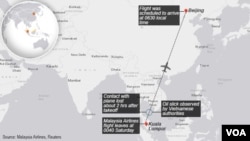BEIJING —
It is still unclear why a Malaysia passenger jet vanished on its way to China early Saturday from Kuala Lumpur. But as authorities investigate apparent security lapses, analysts say they should be a catalyst for bolstering airline safety in the region.
The little information that has emerged from the disappearance of Malaysia Airlines Flight MH370 has frustrated increasingly desperate families and authorities who are still searching for the plane.
In Malaysia Monday, transport minister Hishammuddin Bin Tun Hussein urged people to refrain from repeating rumors until authorities are able to verify what happened.
"I would like to plea, make a plea, especially to the media and the public at large, not to spread and disseminate unverified and false news for two reasons, one because it affects our exercise of search and rescue because unverified news or false news will distract us from work at hand," said Hussein. "And secondly to be fair to the families who are hoping against hope."
While search efforts are intensifying, authorities continue to investigate the identities of two passengers on board the plane who were traveling with stolen passports. Malaysian officials also say five other individuals checked in, but did not board the flight.
According to authorities, all of the bags belonging to those five passengers were removed from the plane before it took off.
The suspicious passengers have naturally raised speculation about broader security problems for the region’s air travel industry.
Rohan Gunaratna, a Singapore-based terrorism expert says that while it is too early to say what ultimately caused the plane to go down, the fact that passengers got on board with stolen passports was a security breach.
Interpol database
In the wake of the 2001 terrorist attacks in the United States, Interpol set up a database to notify governments worldwide when a passport is lost or stolen. Gunaratna says it is a tool that is critical for governments to use.
"If they don't use the database, and if governments don't input data that means they are not doing their best service for the safety and security of those who are traveling," Gunaratna said.
Interpol has already confirmed two of the passports used were stolen and says it is looking into other suspect passports used to board the flight.
Terrorist threats in Asia have been considered low compared to those in Europe and the United States. But Gunaratna says the disappearance of the Malaysia to China flight could change airlines’ security posture in the region.
“I believe the downing of this airline should be a catalyst should be a lightning rod for other governments to take the threat of such incidents seriously," Gunaratna said.
It remains unclear what security lapses occurred that allowed the passengers to board the plane using passports that had been reported stolen.
While some have been quick to speculate that the passport thefts could indicate terrorism might be at play, others have noted that it is also very likely the passengers were illegal migrants or individuals involved in criminal activity, and may have had nothing to do with the flight’s disappearance.
The little information that has emerged from the disappearance of Malaysia Airlines Flight MH370 has frustrated increasingly desperate families and authorities who are still searching for the plane.
In Malaysia Monday, transport minister Hishammuddin Bin Tun Hussein urged people to refrain from repeating rumors until authorities are able to verify what happened.
"I would like to plea, make a plea, especially to the media and the public at large, not to spread and disseminate unverified and false news for two reasons, one because it affects our exercise of search and rescue because unverified news or false news will distract us from work at hand," said Hussein. "And secondly to be fair to the families who are hoping against hope."
While search efforts are intensifying, authorities continue to investigate the identities of two passengers on board the plane who were traveling with stolen passports. Malaysian officials also say five other individuals checked in, but did not board the flight.
According to authorities, all of the bags belonging to those five passengers were removed from the plane before it took off.
The suspicious passengers have naturally raised speculation about broader security problems for the region’s air travel industry.
Rohan Gunaratna, a Singapore-based terrorism expert says that while it is too early to say what ultimately caused the plane to go down, the fact that passengers got on board with stolen passports was a security breach.
Interpol database
In the wake of the 2001 terrorist attacks in the United States, Interpol set up a database to notify governments worldwide when a passport is lost or stolen. Gunaratna says it is a tool that is critical for governments to use.
"If they don't use the database, and if governments don't input data that means they are not doing their best service for the safety and security of those who are traveling," Gunaratna said.
Interpol has already confirmed two of the passports used were stolen and says it is looking into other suspect passports used to board the flight.
Terrorist threats in Asia have been considered low compared to those in Europe and the United States. But Gunaratna says the disappearance of the Malaysia to China flight could change airlines’ security posture in the region.
“I believe the downing of this airline should be a catalyst should be a lightning rod for other governments to take the threat of such incidents seriously," Gunaratna said.
It remains unclear what security lapses occurred that allowed the passengers to board the plane using passports that had been reported stolen.
While some have been quick to speculate that the passport thefts could indicate terrorism might be at play, others have noted that it is also very likely the passengers were illegal migrants or individuals involved in criminal activity, and may have had nothing to do with the flight’s disappearance.








